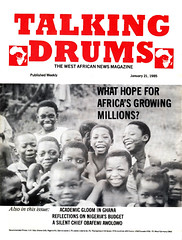The Ghanaian mentality re-visited
A Touch Of Nokoko by Kofi Akumanyi
Needless to say, throughout that turbulent period, the Ghanaian mentality came strongly into force, displaying all its undesirable aspects that have greased the wheels of development (or is it undevelopment?).
So the question one would like to know, naturally, is: what is that mentality? Is there, in fact, a 'mentality' that can be described as particularly Ghanaian? To put the question in a broader perspective: do other nations have some form of 'mentality' or 'way of life' as it is sometimes described?
Julie Burchill, writing in the Sunday Times of January 13, in an article titled "The New Retribution is upon us, and not a moment too soon', made quite a few revealing points about what she calls "the British way of life"..
Analysing the attacks on the society last year by the 'Retributive squad', a category of social elements whose acts include the Mars bar and Turkey hoaxes by the Animal Liberation Front, the shooting of four muggers by New Yorker, Bernhard Goetz, and bombing by Anti-abortion campaigners, traders in foetuses, and Arthur Scargill and his striking miners, she argued that these current trends may be frowned upon by many people in the society. These law breaking, desecration and violence are not compatible with the British way of life," they would say.
"If you have gleaned your national history (British) from the lid of a Quality Street tin, maybe not, but if you accept that countries in which women, and men, who do not own property do not have the vote and that Countries without trade unions are not civilized; and if you accept that we were once like that, you contradict the idea of the 'British way of life'. Because we became ourselves though the beneficial violence of the suffragettes, the Tolpuddle Martu and those others. If it wasn’t for this thoroughly British insurrection we would still be Victorian savages, the sort of people we despise and patronise right now."
Quite an instructive insight into the 'British way of life' which needs no further elucidation - the mentality that keeps the society moving ahead inspite of the national trials and tribulations.
Taking this view of what makes a people assume a national characteristic in their approach to problems and handling of crises, what can we say is the Ghanaian way of life - the mental and psychological outlook on life? To help unravel what constitute the famous Ghanaian mentality of the eighties, I asked my good friend Thomas Asani. Mr Asani, you would like to know, is a man about town who always seems to know what is going on.
"You want to know what Ghanaian mentality is? Well, I can tell you without any fear of contradiction, that it is those unique attributes of Ghanaians which make them face a few problems without making a fuss and take life as it comes."
"If that's what it is all about," I queried, "would you call it a negative or positive attribute?"
"I wouldn't venture to categorise it, but depending on how individuals portray it, the end result may be either way."
"OK, let's take Ghanaians' uncomplaining nature. It is said that a people who do not complain about anything often end up the losers politically, economically etc..."
"Maybe, except that because the majority of Ghanaians are Christians, they believe that since they've built up treasure in heaven, the transient life is not worth fussing over," said Asani.
"In your view, therefore, Ghanaians won't make a song and dance about any earthly issue?"
"I didn't say that. and there you have another aspect of the 'mentality'. We are a fun-lovin and kind people."
"Ah, that's the famous Ghanaian hospitality?"
"You bet, we're hospitable to a fault. We would roast the last chicken for a hungry stranger and starve," he said, warming up to the issue.
"Do these things really happen?" I wanted to know.
"Of course they do. Just look at the country today. Many people do not like what's going on, but everybody going about his or her business as usual, hoping that God would intervene," he said.
"Miracles don't happen these days. The Ghanaian mentality may be apathetic to national issues, but to think that God would solve our problems is asking a little too much from the old man, isn't it?".
"You may be right, but life in the country today underscores the attitude. People are making the best a bad situation."
"Everybody? Surely we cannot be homogeneous; there must be a few Ghanaians whose mentality is different," I said. "People who would not leave problems in the hands of God; who would complain and insist on their rights until justice is done."
"There are."
"You sure?" I couldn't contain my excitement. "You mean there are people who have a different mentality? Who are they?"
"It's a unique club and number only a few thousand characters who through a special discipline had come to acquire that mentality."
"Oh, I know; you aren't talking about the military, are you?"
"Of course not, in spite of the devastation that they've wreaked on the nation, the military when it come down to brass tacks have one hundred percent 'Ghanaian mentality' which surfaces clearly when they are out uniforms."
"Then who are these mysterious group of people? Hang on. People's Defence Committees."
"Touche! I thought you would never cotton on to that."
"Well, if they are so special, why have they reportedly been re-organised?"
"That's another aspect of the 'Ghanaian mentality'. We love new things.”
